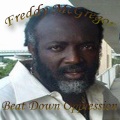
Beat Down Oppression
Freddie McGregor is one of Jamaica's most durable and soulful singers, his career started in the '60s, when he was just seven years old. Since then, he's adapted his vocals to every change in Jamaican music; from Ska and rock steady, roots reggae to lover’s rock he maintained a strong presence on the reggae scene. Freddie McGregor was born in Clarendon, Jamaica on June 27, 1956. At the age of seven, he started singing backup with the Caledonians . They recorded for producer "Coxsone" Dodd's Studio One label. When they split in the mid-'60s, Freddie McGregor teamed up with forma-member Ernest Wilson to form a new duo. They recorded several single sides, including "Why Did You Do It" and "Do Good and Good Will Follow You." Freddie McGregor stayed on at Studio One for much of the '70s, working as a session drummer and backup singer while developing his own vocal style. During this period, he began writing some of his own material, including songs like "Tomorrow Is Like today," "Go Away Pretty Woman," and "What Difference Does It Make." In 1975, Freddie McGregor converted to Rastafari, which had a profound impact on his music. Still at Studio One and working with Earl "Chinna" Smith, he recorded the classics "Rasta man Camp" and "I Am a Rasta" right off the bat, and followed them with a string of singles that substantially raised his profile in Jamaica: "Mark of the Beast," "Sergeant Brown," "Jogging," "Natural Collie," "Zion Chant," "Walls of Jericho," "Africa Here I Come," "Come Now Sister," and "Bobby Babylon" among them. In 1981, Freddie McGregor scored a huge hit single with "Big Ship," which catapulted him to the front rank of reggae stars in the immediate post-Marley era, along with Dennis Brown and Gregory Isaacs. His next LP arrived in 1982, also titled Big Ship, and featured production by Linval Thompson and musical backing by the Roots Radics. It too was highly successful, both creatively and commercially. Signing with Ras for 1983's Come on Over, Freddie McGregor extended his creative hot streak to an international audience, making a name for himself in the U.K. and U.S. His 1984 follow-up Across the Border was a slightly pop pier effort that contained his hit reggae cover of "Guantanamera." Continuing in this crossover vein, in hopes of surviving amid the dancehall revolution, McGregor released all in the Same Boat in 1986; it produced a major hit in "Push Come to Shove," which became his first U.K. chart entry. He sparked the interest of Polydor Records, and found further U.K. success with "That Girl" and a cover of the Main Ingredient's "Just Don't Want to Be Lonely," which made the U.K. Top Ten in 1987. Freddie McGregor's relationship with Polydor proved short-lived, however, and he formed his own label, Big Ship, in 1989. The first release was an all-covers LP called Jamaican Classics, which was so well-received that he quickly recorded a second volume (and, eventually, a third in 1996). 1991's now also featured several covers, and 1993's Legit was equal-time collaboration with Dennis Brown and Cocoa Tea. Also in 1993, he had a hit with his lover’s rock cover of Justin Hinds' "Carry Go Bring Come." 1994's Push On provided much of the foundation for what many would call his finest outside production work, After slowing his pace in the late '90s, McGregor returned in 2000 with the acclaimed Signature, which restored his typical balance of roots reggae and lovers rock with touches of dancehall. He followed it two years later with a similarly well-received album, the Grammy-nominated Anything for You. Freddie McGregor has kept a regular worldwide touring schedule, while on tour he worked with UK producer Keith Wint to record Beat Down Oppression.


